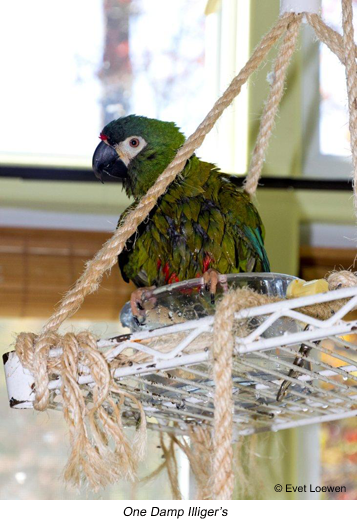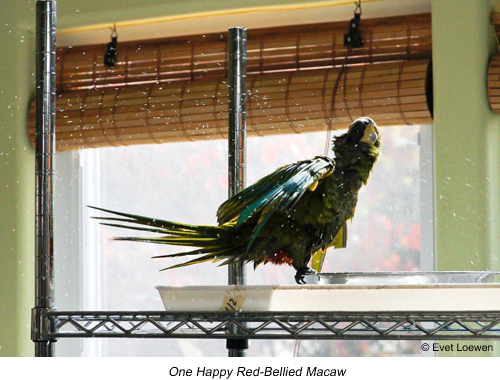Why Acquire Multiple Small Macaws When One Doesn’t Understand the FIRST Small Macaw One Gets?
It’s been a while since I’ve contributed here because I’ve been trying to figure out how I decided to acquire a bunch of mini-macaws, including Red-Bellied Macaws. This is a difficult topic, the one of owning several birds. Like, more than ten, and less than fifty. In my defense, a lot fewer than fifty, but a squidge more than ten.

From 1998 to 2005, I acquired sixteen small macaws. The species included one Chestnut-Fronted Macaw, one Yellow-Collar Macaw, three Red-Shouldered (Hahn’s) Macaws, six Blue-Winged Macaws (Illiger’s), and eventually five Red-Bellied Macaws.
Of this group, prior owners gave me two of the Red-Shouldered Macaws and the Yellow-Collar. My first Red-Bellied Macaw, an older wild-caught, was only with me for less than two years and died of visceral gout. An Illiger’s and a Red-Bellied Macaw, both young, were lost due to the mistaken belief that they would not leave my shoulder if I stepped outside, and were not retrieved alive. One lucky Illiger’s who needed his own space was happily re-homed with good friends. The rest still take a disproportionate amount of my time and treasure, but reside contentedly now in their own secure private aviary facility built especially for them.
The small macaws were and remain a favorite.[1] They are feisty, raucous, and handsome. They like music, good food, and remind me in a very favorable way of living in Brasil. Of course, they themselves, were they in their native habitat, would occupy parts of Brasil.
If I could tell you a logical reason for starting a collection of birds, it would have been written weeks ago and would be incisive. Taking birds willingly surrendered from prior owners doesn’t feel so odd. As to ones obtained without such a compelling rationale, there is no simple, direct, logical reason that I myself understand for maintaining such a persistent preoccupation with small parrots. All I know is that by the year 2000, P.A.S. (Parrot Acquisition Syndrome) was in full swing, and it seemed totally fine to consider having an entire flock of small macaws, with the possible representation of every small macaw species available.
What I can proffer as to my attraction to small macaws (and parrots in general) is the following:
- Parrots stop time. They live a long time and for large blocks of time they do not change much physically. It is jarring to look at records indicating their ages and years they’ve been with me, because they age so much better than I do.
- Be Here Now. That’s what they require. It’s a form of meditation to spend time with lots of birds. Turn aside your anxiety or the parrot will mirror it. Don’t yell or the parrot mimics it. Don’t enter their space, wherever that is, in a state of high stress, or your hearing will pay the price for it.
- Biology rules. It does with us though we forget that. It certainly does with these practically wild flighted creatures. They search for cavities in closets, engage in foraging on floors, under towels and any other intriguing space, find bonded others in two-legged featherless and flightless beings, engage in calling loudly to their flock or bonded other by use of calls-expecting-responses, or human language, as a few examples.
- Continuous improvement is mandatory. Especially on dietary matters. We don’t always know what they evolved to eat, but they didn’t all evolve to eat the very same foods (or seeds). They don’t do well unless the biped caring for them starts to get educated about their nutritional needs. Which knowledge sometimes helps the biped, too.
- Smaller beaks (than the large macaws) are more user-friendly. This is especially good for people with hang-ups about step-up training or who are easily intimidated by small green bossy parrots, let alone the large colorful or pure white ones.
- Small macaws have No Hidden Agendas. This is applicable to most parrots and probably all kinds of species other than Homo sapiens. WYSIWYG (old techie term for “What You See Is What You Get”).
- Mini-macaws minimize materialism. To live with parrots and small macaws is to learn that the objects one prizes are unimportant. Because one has to choose between the mini-macaw that grabs, with talons and/or beak, the watch or ring or earring or blouse or picture frame or molding or chandelier, and destroys it within three seconds, and the feeling of frustration derived from the destruction of the item(s). Over time, material things just have not meant as much as the living, breathing, feathered and flighted dinosaur descendants that occupy time and space with me.
So I guess the general attraction is that these small macaws inspire lessons in appreciating the moment, understanding biology, learning about evolution and its effects on nutrition, overcoming fear of physical pain, putting living creatures (humans included) at a higher priority than stuff, and being authentic. Very Zen, no? Other than as in the old potato chip ad that “you can’t have just one”, I can’t articulate a good reason for setting out to get a bunch of small macaws -- only that I did do so. And that the Red-Bellied Macaws have presented me with the greatest challenge in keeping them here on the planet with me, in terms of their health and well being.
Parting thought. Once I was interviewed for a possible story by a reporter for the Wall Street Journal who wanted to know why Peregrine falcons were so fascinating to me. This because of the role I played in a prior life, with an educational project about bringing this species back from extinction. I said that Peregrine falcons are spectacular in flight, extraordinarily beautiful, wonderful in raising young. This very nice young lady pressed and pressed, and none of the statements I made seemed adequate for her purposes. Finally I simply said “I don’t know why they draw me in. Why do people play golf?” [2]
Why indeed.
So next post (Part 4), the specifics of my Red-Bellied Macaws come to the foreground.
---------
[1] We will not be discussing the dilemma of acquiring or listing other non-mini-macaw species in our parrot count.
[2] This response elicited much laughter from the interviewer but no article in the WSJ.

































